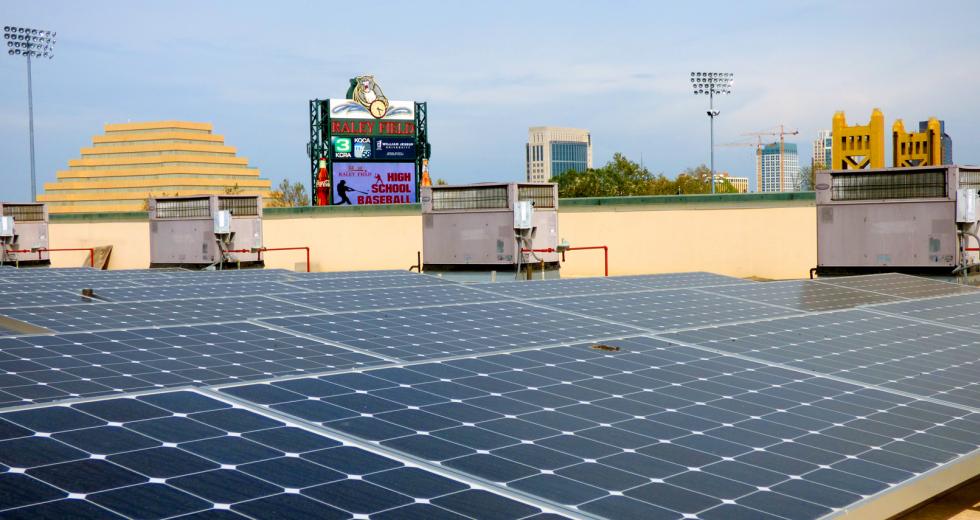When River Cats season ticket holder Jared Pane and his family lower their kickstands at the Raley Field stadium bicycle valet, he breathes a little easier. He knows their fanatic support of the West Sacramento minor-league team is not only a fun tradition, but also good for the environment.
“Living in West Sacramento allows me the luxury of riding my bike to Raley Field,” Pane says. “I’m doing my part by not congesting the streets. The last thing we need is another car on the road.”
The River Cats recently unveiled its “Road Relief” program to tackle environmental impacts created by fans traveling to baseball games. In partnership with the Sacramento Region Spare the Air program, the team now offers free parking (a $10 value) to groups of four or more who carpool. Additionally, complimentary bike valet is now available. The team has also introduced a Thursday night trolley with routes from various downtown and midtown locations. If these methods become popular with fans, the River Cats will help reduce traffic and air pollution.
These new initiatives come on the heels of the team receiving the Clean Air Award in the sustainability category in May from the nonprofit Breathe California of Sacramento-Emigrant Trails. “The River Cats are not only champions on the field, but champions of clean air, ensuring a healthy outdoor environment to enjoy baseball for generations to come,” says Kori Titus, CEO of BREATHE.
The Sacramento region has some of the worst air pollution in the nation, according to the U.S. Environmental Protection Agency. The valley’s geography contributes to the poor air quality. The summer inversion layer traps pollutants close to the ground, preventing them from escaping into the upper atmosphere.
The EPA has a classified the region as a “severe nonattainment area,” which means it is not meeting certain air-quality standards. There are only five severe or extreme nonattainment areas in the nation. Others in California include Los Angeles and the San Joaquin Valley. Bad air quality adversely affects health, especially in children and elderly.
“[Our sustainability measures are] cost-effective, good for the environment and make fans and employees proud of their team.”
Ross Richards, manager of corporate partnerships, River Cats
In addition to the measures to improve air quality, the River Cats’ stadium now features a community garden, developed in collaboration with a local business, Green Acres Nursery & Supply. The garden is accessible to fans who visit Raley Field. Produce grown onsite includes cabbage, tomatoes, citrus fruit, apples, strawberries and kiwi vines. More than 550 pounds of produce was donated in 2015 to the Raley’s Food For Families program, which benefits local food banks.
The River Cats have further reduced Raley Field’s carbon footprint with the installation of a 154-kilowatt solar array; panels are positioned at various locations around the stadium, where the sun fuels LED boards, backlit signs, offices, suites and kitchens. The stadium has also undergone a lighting retrofit projected to reduce its outdoor energy consumption by more than 70 percent during the 2016 season. The River Cats project a savings of $62,000 during the first year of utilizing the solar array.
“These measures are important for the River Cats because they follow the triple bottom line approach to sustainability,” says Ross Richards, manager of corporate partnerships for the team, referring to economic, environmental and social responsibility. “In this case, [they are] cost-effective, good for the environment and make fans and employees proud of their team.”
The team also partnered with Republic Services, a waste management company, to devise a plan to reduce food waste at Raley Field. This program involves collecting scraps from green bins around the park to become fertilizer and low-emission fuel for the Republic Services’ fleet of trucks, instead of going into landfills. In 2015, this new diversion plan cut food waste more than 500 percent.
These combined measures earned the River Cats major recognition as one of the best stadiums in the minor league from the Green Sports Alliance (GSA), a national organization that consults with sports teams, venues, leagues and events to promote environmental practices. “The team’s achievements in sustainability have established them as a leader in [Minor League Baseball] and beyond,” says David Muller, GSA membership director.
The River Cats’ efforts nicely complement the Kings’ new Golden 1 Center in downtown Sacramento, which will also include cutting-edge sustainability features. “Considering what the River Cats are doing, paired with the Kings’ new arena, I think Sacramento should be proud,” Pane says. “Hopefully, this will lead the way for other companies to follow suit.”




Comments
Thought you might like this...
FYI
Reducing landfill is commendable but the math is a bit fuzzy. Is it possible to cut anything by more than 100%?
"In 2015, this new diversion plan cut food waste more than 500 percent."